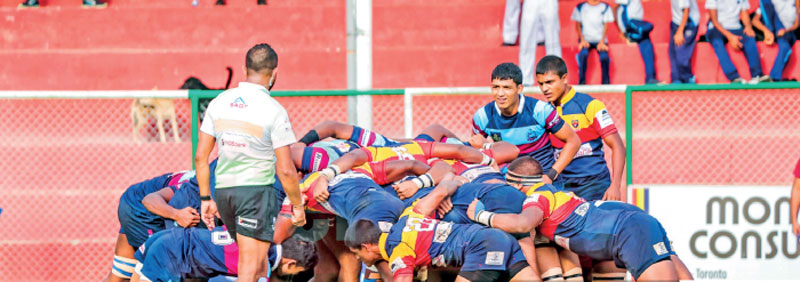Tuesday Feb 17, 2026
Tuesday Feb 17, 2026
Thursday, 25 July 2024 02:56 - - {{hitsCtrl.values.hits}}

 Rugby is a sport celebrated for its complexity and intensity, requiring referees to make split-second decisions that can significantly impact the outcome of the game. The intricacies of officiating rugby at the school level in Sri Lanka pose unique challenges, necessitating innovative solutions to ensure fair play and player safety. Artificial Intelligence (AI) presents an opportunity to revolutionise how rugby is officiated, providing tools and systems that enhance the accuracy, consistency, and effectiveness of referees. This paper explores how AI can be harnessed to assist referees in Sri Lanka’s school rugby sessions, addressing current issues and improving the overall quality of the sport.
Rugby is a sport celebrated for its complexity and intensity, requiring referees to make split-second decisions that can significantly impact the outcome of the game. The intricacies of officiating rugby at the school level in Sri Lanka pose unique challenges, necessitating innovative solutions to ensure fair play and player safety. Artificial Intelligence (AI) presents an opportunity to revolutionise how rugby is officiated, providing tools and systems that enhance the accuracy, consistency, and effectiveness of referees. This paper explores how AI can be harnessed to assist referees in Sri Lanka’s school rugby sessions, addressing current issues and improving the overall quality of the sport.
Video analysis and instant replay
One of the primary applications of AI in rugby officiating is through video analysis and instant replay systems. AI-powered video analysis tools can review game footage in real-time, offering referees the ability to make accurate decisions on critical plays, such as tries, fouls, and forward passes. These systems use multiple camera angles to provide comprehensive coverage of the field, ensuring that referees have access to the best possible perspective for making calls.
In Sri Lanka’s school rugby sessions, implementing AI-driven instant replay systems can significantly reduce human error and enhance decision-making. For instance, when a try is scored, AI can quickly analyse the footage to confirm whether the player successfully grounded the ball within the try zone, providing referees with definitive evidence to support their decisions.
Player tracking and movement analysis
AI’s ability to track player movements and analyse patterns offers another significant advantage in rugby officiating. By using advanced algorithms, AI can monitor player positions, movements, and interactions throughout the game, detecting infractions such as offside positions, illegal tackles, or forward passes.
For Sri Lanka’s school rugby sessions, player tracking systems can help referees identify and penalise rule violations more effectively. These systems can provide real-time alerts to referees when a player is offside or when an illegal tackle occurs, ensuring that infractions are promptly addressed. This not only improves the accuracy of officiating but also promotes fair play and player safety.
Automated decision support systems
Developing AI-based decision support systems can provide real-time feedback and suggestions to referees based on the rules of rugby and historical data. These systems can analyse ongoing play and alert referees to potential rule violations, offering recommendations on the appropriate course of action.
In the context of Sri Lanka’s school rugby, automated decision support systems can serve as valuable tools for referees, helping them navigate complex game situations with greater confidence and accuracy. For example, if a scrum collapses, the AI system can quickly assess the situation and suggest whether a penalty should be awarded, providing referees with crucial information to make informed decisions.
Training and performance evaluation
AI-driven training programs offer significant potential for improving the skills and consistency of rugby referees. These programs can simulate various game scenarios, allowing referees to practice their decision-making in a controlled environment. AI can provide detailed feedback on their performance, highlighting areas for improvement and reinforcing correct decision-making processes.
Implementing AI-based training programs for referees in Sri Lanka’s school rugby sessions can enhance their ability to handle the pressures of live games. By regularly engaging with these training tools, referees can build their confidence and competence, leading to more consistent and accurate officiating during actual matches.
Injury prediction and prevention
Player safety is a paramount concern in rugby, and AI can play a critical role in predicting and preventing injuries. By analysing player movements and collisions, AI systems can identify patterns that indicate a high risk of injury. This information can help referees and medical staff intervene before injuries occur, ensuring that players receive timely attention and reducing the likelihood of serious harm.
In Sri Lanka’s school rugby sessions, implementing AI-driven injury prediction systems can enhance the safety of young athletes. These systems can monitor the physical condition of players in real-time, providing alerts when a player shows signs of fatigue or distress. This proactive approach to injury prevention can help maintain the health and well-being of players, fostering a safer and more enjoyable rugby experience.
Rule compliance monitoring
Continuous monitoring of rule compliance is essential for maintaining the integrity of rugby matches. AI systems can analyse game data in real-time, ensuring that all players adhere to the rules and alerting referees to any infractions that need their attention.
For Sri Lanka’s school rugby, AI-based rule compliance monitoring can ensure that games are played fairly and according to the established regulations. These systems can detect and report violations such as forward passes, high tackles, or offside positions, providing referees with the information they need to enforce the rules consistently and effectively.
Crowd and environmental noise analysis
The influence of crowd noise and environmental factors can impact a referee’s ability to make accurate decisions. AI can analyse these external factors, helping referees maintain control over the game and ensuring that their decisions are not unduly influenced by external noise or pressure.
In Sri Lanka’s school rugby sessions, AI-driven crowd and noise analysis systems can help referees focus on the game without being distracted by the surrounding environment. By filtering out irrelevant noise and highlighting critical game sounds, these systems can enhance the overall accuracy and fairness of officiating.
Post-game analysis
AI can also be utilised for post-game analysis, providing a comprehensive review of the match and the performance of the referees. This analysis can identify any missed calls or incorrect decisions, offering valuable insights for further training and improvement.
For referees in Sri Lanka’s school rugby, post-game AI analysis can serve as a powerful feedback tool. By reviewing their performance with the aid of AI, referees can learn from their mistakes and refine their decision-making skills, leading to continuous improvement and higher officiating standards.
Conclusion
The integration of AI in rugby officiating offers a transformative approach to addressing the challenges faced by referees, particularly in the context of Sri Lanka’s school rugby sessions. From real-time video analysis and player tracking to automated decision support and injury prediction, AI provides a suite of tools that enhance the accuracy, consistency, and safety of rugby officiating. By adopting these AI technologies, Sri Lanka can elevate the quality of its school rugby, ensuring fair play, protecting players, and fostering a more enjoyable and competitive sporting environment.
The author is a past rugby player with 30 years of IT industry experience, and is also the Chairman of the Federation of Information Technology Industry Sri Lanka.